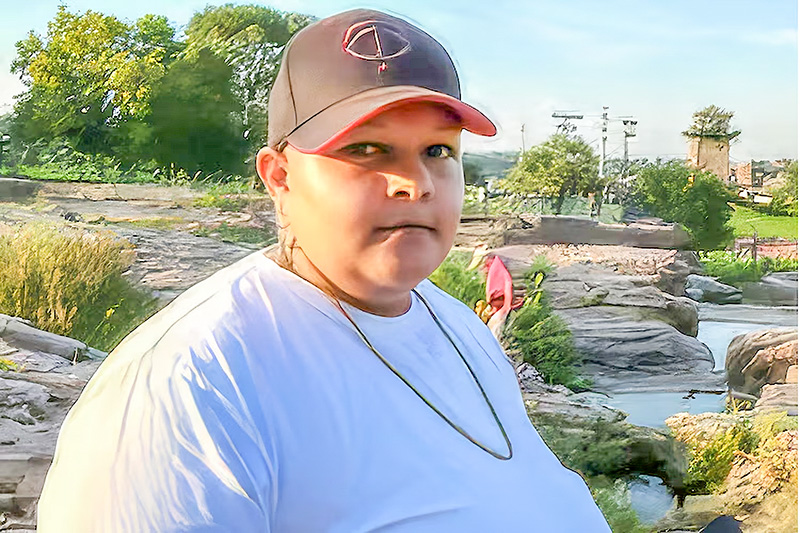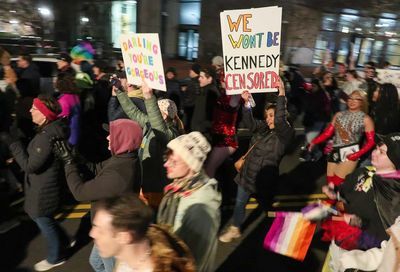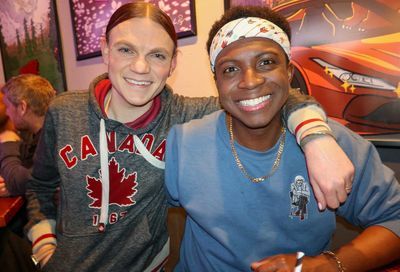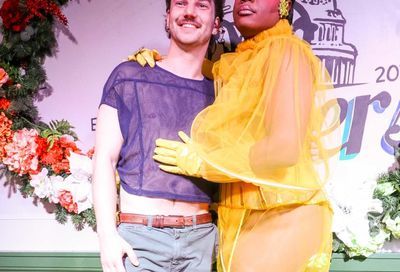Protecting Peers
Rainbow Response meeting guides response to domestic violence
About 80 members of the metro D.C. GLBT community and allies gathered Tuesday night to continue strategizing against one of the community’s stealthier enemies: same-sex, intimate-partner violence. This collective bane, experts agreed, can hide among GLBT people because they are its victims, perpetrators and enablers. Tuesday’s town-hall meeting, called by Rainbow Response, was a local step in shaking up that status quo.
The Black Lesbian Support Group (BLSG) of Whitman-Walker Clinic’s Lesbian Services Program put it succinctly: ”Be silent no more.” That was the ongoing call of a series of skits nine members of the group presented to better illustrate the many ways that such abuse can manifest itself, from overt violence to subtle, psychological control.
”Sometimes, before we know it, we’re in the midst of it,” warned BLSG President Tina Townsend, introducing the skits and audience-participation component in which players would repeat, ”Be silent,” to the audience’s shouted response of, ”No more!”
The panelists for the gathering, which ran about two hours at the Human Rights Campaign’s Equality Forum at 1640 Rhode Island Ave. NW, were Marie Lilly of Baltimore’s TurnAround; Morgan Lynn of Women Empowered Against Violence; Officer Joe Morquecho of the Metropolitan Police Department’s Gay and Lesbian Liaison Unit (GLLU); Kenneth E. Noves of the D.C. Coalition Against Domestic Violence; and Amelie Zurn, a clinical social worker. June Crenshaw moderated the event, with welcoming remarks from Christopher Dyer, the mayor’s liaison to the GLBT community.
With their varied backgrounds, the panelists spoke to a variety of issues raised by the audience — concerns ranging from how to get perpetrators of violence into some form of therapy, to how the community can stem violence with limited resources.
To illustrate the scope of the problem, Morquecho offered a disturbing statistic: In 2006, 555 crimes were assigned to the GLLU. Of those, about 75 percent were GLBT domestic violence cases.
Lynn, whose work as an attorney has made her fluent in the D.C. Superior Court’s protocols, offered some hope to attendees, pointing out some of the legal tools available to victims of partner abuse, such as protective orders. She cautioned, however, that seeking help in the courts may not be a reasonable avenue for people who may have had uncomfortable dealings with police in the past.
In that vein, Noves insisted on the value of mandated training for MPD officers around these issues, lamenting that’s not the case. Referring to the question of what the community can do with limited resources, he struck a similar note, pointing out, ”We keep coming back to the lack of resources.”
Zurn suggested, however, a cost-effective first step people might make: ”You all have a role to play,” she said, explaining that what most people in abusive relationships need is for someone to recognize their situations. ”You become, in that sense, a ‘service provider.’ You can be the hand that holds someone.”
For more information about Rainbow Response, visit www.rainbowresponse.org.
Support Metro Weekly’s Journalism
These are challenging times for news organizations. And yet it’s crucial we stay active and provide vital resources and information to both our local readers and the world. So won’t you please take a moment and consider supporting Metro Weekly with a membership? For as little as $5 a month, you can help ensure Metro Weekly magazine and MetroWeekly.com remain free, viable resources as we provide the best, most diverse, culturally-resonant LGBTQ coverage in both the D.C. region and around the world. Memberships come with exclusive perks and discounts, your own personal digital delivery of each week’s magazine (and an archive), access to our Member's Lounge when it launches this fall, and exclusive members-only items like Metro Weekly Membership Mugs and Tote Bags! Check out all our membership levels here and please join us today!




















